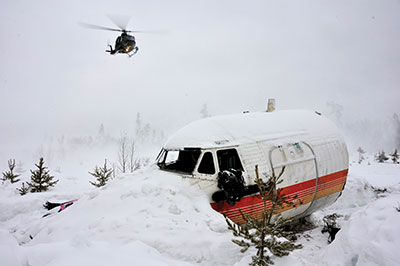
Features
Operations
Waypoint: Saluting SAR professionals
When the worst-case scenario becomes reality and you have a mishap with your aircraft, there are two groups in Canada who can instantly become your best friends.
July 9, 2013 By Rob Seaman
When the worst-case scenario becomes reality and you have a mishap with your aircraft, there are two groups in Canada who can instantly become your best friends.
 |
| PHOTO: RCAF
|
One is the search-and-rescue professionals, known as CFSAR, the Canadian Forces’ search-and-rescue unit. The second is the Civil Air, Search and Rescue Association, better known as CASARA, who work hand in hand with CFSAR.
CFSAR came to the attention of many Canadians in late April when Auditor General Michael Ferguson posted an alarming report. And although the report points out that aging equipment is hampering efforts to produce a top-notch SAR response – coupled with staffing and training concerns – there are many positives to highlight about the SAR system in Canada.
As its website best describes it, “The National Search and Rescue Secretariat (NSS) is an autonomous arm’s length organization within the Department of National Defence, accountable to the Lead Minister for Search and Rescue who is also the Minister of National Defence.”
The NSS was established in 1986 and as such is responsible for management and coordination of the National Search and Rescue (SAR) Program. While it does not direct or manage the work of its partners, the NSS brings them together to encourage collaboration and ensure best use is made of their diverse resources and capabilities.
The following federal departments are responsible for search-and-rescue delivery in Canada:
- Canadian Forces (Department of National Defence)
- Canadian Coast Guard (Department of Fisheries and Oceans)
- Royal Canadian Mounted Police (Public Safety Canada)
- Transport Canada
- Meteorological Service of Canada (Environment Canada)
- Parks Canada (Agency)
Representatives from these organizations comprise the Interdepartmental Committee on Search and Rescue (ICSAR). As noted on the main CFSAR website, “Within the non-federal jurisdiction, the NSS works directly with provincial and territorial SAR authorities and police services to develop and standardize the quantity and quality of SAR service.”
Regardless of whether you are talking about CFSAR or CASARA, the word “volunteer” comes often in their materials. These unpaid and devoted specialists are the backbone of the SAR response in Canada and provide the critical service delivering search and rescue on the water, in the air and on the ground. They sacrifice their time, their money and sometimes their careers to answer the call when it comes.
The Civil Air, Search and Rescue Association (CASARA) also play a significant role in the SAR equation. Celebrating its 25th anniversary, CARASA is made up of 2,800 volunteers who are called upon to search for individuals when they become lost or are in distress. Their mission is “to support Canada’s Search and Rescue (SAR) program and to promote aviation safety.” Funded by the Department of National Defence, CASARA volunteers provide air search assistance to the Royal Canadian Air Force, and as a means to reduce overall SAR incidents, promote flight safety for general aviation.
This dedicated group consists of pilots, navigators, spotters, search coordinators, electronic search specialists, radio operators and administration staff. They are trained to work as spotters on military aircraft, and to carry out searches using light aircraft and ground vehicles. CASARA has been the umbrella organization for independent provincial and regional groups since 1986.
Beyond its search-and-rescue work, the group also gives back to the community and helps build for the future through the CASARA Foundation – a subset of the main association that was incorporated in 1998. The “foundation” presents scholarships and bursaries to deserving individuals who wish to enhance their education or further their aviation careers.
SARSCENE is an annual event that is hosted by the National Search and Rescue Secretariat (NSS) and is co-hosted by a provincial or territorial government in association with local search-and-rescue volunteer associations. SARSCENE and the annual awards are an integral part of the overall CASARA effort. The SAR Conference and Trade Show that is part of SARSCENE are held at a different location across Canada each year. The event is an interactive tradeshow that brings together SAR manufacturers and service providers, and offers SARSCENE delegates the opportunity to network with peers, the private sector and the academic sector.
In addition to the SAR Games – a friendly and competitive learning opportunity – the program includes sessions targeted to SAR management, SAR volunteers, and SAR response, prevention and mitigation. SARSCENE also honours Canada’s SAR elite through the National SAR Awards of Excellence Program.
When all is considered, the folks involved with SAR have a job that most do not think much about – until they need it. And while the Auditor General may have some less than ingratiating observations, the simple fact is that these women and men – mostly volunteers – provide an incredible service and are worthy of positive praise and recognition.